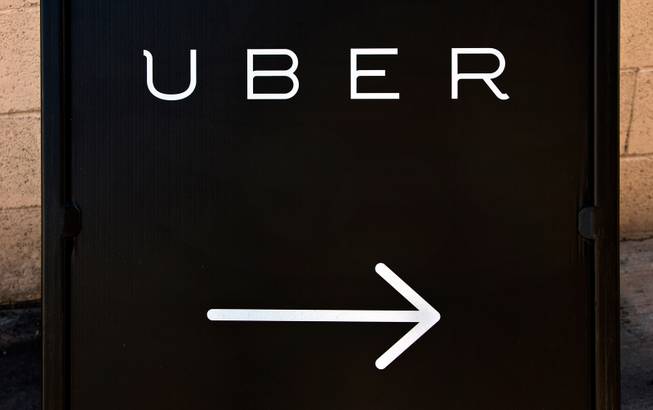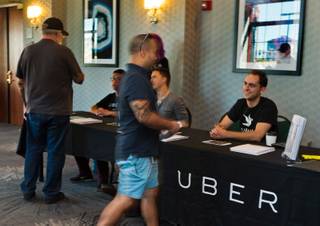
A sign for the Uber Activation Center on Wednesday, Sept. 16, 2015, at Hampton Inn Tropicana.
Thursday, Oct. 29, 2015 | 2 a.m.
They catch rides in buses, Uber vehicles and limos, wearing the same casual attire as the tourists around them on the Las Vegas Strip.
But that’s where the similarities end between the Nevada Transportation Authority’s undercover investigators and the visitors they’re working to protect.
The NTA employs a handful of full-time, plainclothes agents to carry out its enforcement in the field. And now, with ride-sharing companies Uber and Lyft ramping up their operations in Las Vegas, the NTA is looking to hire additional investigators.
The prospective hirings, along with news about recent citations, have drawn attention to the little-known practice of using undercover agents to keep an eye on ride-to-hire drivers.
More than 40 transportation investigators work in Nevada, where the transportation authority currently employs seven plainclothes agents. The vast majority of work for those agents consists of conducting routine patrols during which they dress as tourists, scope out suspicious behavior and wait to be approached by drivers who violate the law by offering rogue, off-the-books rides.
With $650,000 in fees collected from Uber and Lyft for applications to operate in Nevada, the transportation authority has plans to hire another three officers. Another 34 investigators work for a separate Nevada Taxicab Authority regulating cabs in Clark County. It has a plainclothes unit and uniformed officers.
“It’s not a unique business model,” said Andy MacKay, the recently retired chairman of the transportation authority. “It’s very similar to dozens of regulatory agencies in Nevada.”
In fact, as one might expect, the Gaming Control Board and other state regulatory agencies use plain-clothes officers, said transportation authority commissioner Keith Sakelhide. But few of these agents likely do field work that requires them to enter a car, waiting for an appropriate time to reveal themselves and explain the violation.
Despite their appearance as tourists, the officers are all POST-certified, meaning that they have gone through basic training as peace officers, and therefore also have the power to issue citations for regulatory violations. The training includes learning about legal procedures and patrol operations. It also includes a physical fitness test. Some hires have previous experience in law enforcement or have worked for regulatory agencies.
“We have a good mix of folks,” Sakelhide said.
Even though some investigators have law enforcement backgrounds, Sakelhide and MacKay want to dispel the idea that their officers are like the characters out of a crime show.
“We are not a cop shop,” MacKay said. And in a separate interview, Sakelhide added: “We don’t have a SWAT unit. We don’t have AK-47s. Undercover has kind of an insidious tone.”
Still, there is a sting-operation feel to the enforcement.
“On Oct. 2015, Investigator Martines and I were working enforcement of Uber drivers and their activities at the MGM Hotel Casino valet in Las Vegas,” an investigator wrote in an enforcement report on Oct. 12. “I had received several complaints from various sources that Uber drivers were providing transportation outside of the software application for cash at this location.”
A driver in a maroon Acura then pulled into MGM’s Uber and Lyft pickup area around 3 p.m , the report said. After the investigators told the driver they did not have a credit card and were waiting to pay cash to a limo, he eventually offered them an illegal under-the-table ride.
Sometimes, drivers get testy when they find out that the undercover officers work for the transportation authority. Consider the report of what happened when an NTA officer displayed her badge to a Prius driver who offered an under-the-table ride near the Miracle Mile Shops.
“As I was identifying myself to the driver and explaining the purpose of the stop, the driver attempted to put the vehicle into drive, in an effort to drive off while I was in the front passenger seat,” the report said. “I repeatedly shouted out commands for the driver to stop and not touch the gear shift. Then, for officer safety purposes, I commanded the driver to not touch anything inside the vehicle and directed him to immediately exit. After making several loud comments to the driver, he eventually exited the vehicle.”
While there is a certain fascination with any undercover investigation, many regulatory agencies overseeing transportation employ plainclothes investigators rather than rely solely on local law enforcement. Take the San Francisco agency charged with overseeing the city’s taxicabs.
The San Francisco Municipal Transportation Agency has three investigators assigned to street enforcement. They have performed plainclothes enforcement, Robert Lyles, a spokesman, said. And New York City’s Taxi & Limousine Commission, which also regulates Uber and Lyft, employs about 170 uniformed officers but also uses plainclothes agents for some of their investigations.
“That’s exactly the kind of deterrent that a regulator needs,” said Allan Fromberg, a spokesman for the New York City commission, who compared the officers to secret shoppers.
Sakelhide said transportation authority citations also result from operational inspections by staff and scanning sites like Craigslist to find advertisements for unlicensed rides. Still, a high percentage of the approximately 1,000 citations the authority issues per year result from patrols by officers dressed as tourists.


Join the Discussion:
Check this out for a full explanation of our conversion to the LiveFyre commenting system and instructions on how to sign up for an account.
Full comments policy